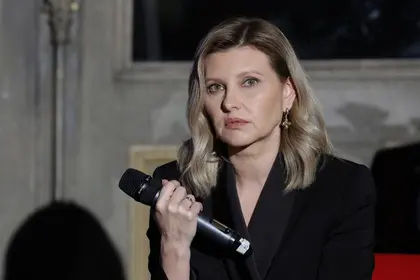The BBC’s Laura Kuenssberg spoke to First Lady Olena Zelenska in Kyiv on Dec. 8, in which Zelenska gave the stark message that Ukrainians are in “mortal danger” unless international aid continues.
The interview, which took place hours after air raid sirens sounded over the city, began with the First Lady describing how Ukrainians have had no choice but to get used to the sirens, as well as what first goes through her mind when she hears the attack alarm ring out.
JOIN US ON TELEGRAM
Follow our coverage of the war on the @Kyivpost_official.
“When I hear a siren, my first thought – if it is daytime and my child is at school – is whether they have gone down to the shelters,” Zelenska said.
“My second thought is, how long the alert is going to last and if I will manage to accomplish everything planned. Work stops for everyone. Air raid alerts are not just about the fear that a missile will hit. The alert means that everything stops; every time it has an effect on the economy.”
Describing one of the hardest things she’s seen, Zelenska said that “childhood is on pause – it’s stolen”, adding that as many as one third of Ukraine’s children are unable to attend school because there are physically no shelters.
“As a matter of urgency, shelters are being set up and equipped in Ukraine for as many children as possible to go back to what is at least remotely a normal life,” Zelenska stated.

Ukraine Forces Undergo Nuclear Forensics Training at US Laboratory
Addressing a question from Kuenssberg about a “mood change” in the US, along with Congress “dragging its feet” over a proposed multi-billion-dollar aid bill for Ukraine, the First Lady acknowledged the “very complicated situation” and that Ukraine needs aid desperately.
“In simple terms, we cannot get tired of the situation, because otherwise we will die; and if the world gets tired, they will simply let us die.”
Noting the “danger” of aid slowing down, Zelenska emphasized that the current situation “constitutes a mortal danger to [Ukrainians]” and that Ukraine needs any kind of support – even moral.
When asked by Kuenssberg if she felt that support has faded and that the world is forgetting Ukraine, the First Lady said “we do worry,” adding that “being worried won’t change anything.”
Turning attention to Ukraine’s ability to defend itself, Zelenska made the point that Ukraine currently has enough missiles for its air defenses to take down what flies in, but that she “[does not] want to even imagine what might happen if they run out.”
“We count losses every day, and if the help stops, the losses will be impossible to count,” Zelenska said,
The First Lady’s message to US politicians and Western audiences who may lack confidence in Ukraine’s chances of winning the war was that aggression and destructive forces “spread like a virus,” and that when a destructive force senses weaknesses among organizations that are there to protect piece, “that chain reaction continues.”
Zelenska then addressed points of criticism leveled upon her husband, President Volodymyr Zelensky, with Kuenssberg referring particularly to statements from the mayor of Kyiv that Zelensky is in danger of becoming an “autocrat.”
The First Lady responded that people thinking of making such public statements should “consider the consequences for the morale of Ukrainians,” and that the mayor of Kyiv “really needs to pay attention to [his own duties].”
Finally, when asked about the pressure faced by her family, Zelenska said that the pressure is physically noticeable in President Zelensky, but that he “has the strength to carry on” and is in “the exact place he needs to be.”
You can also highlight the text and press Ctrl + Enter






